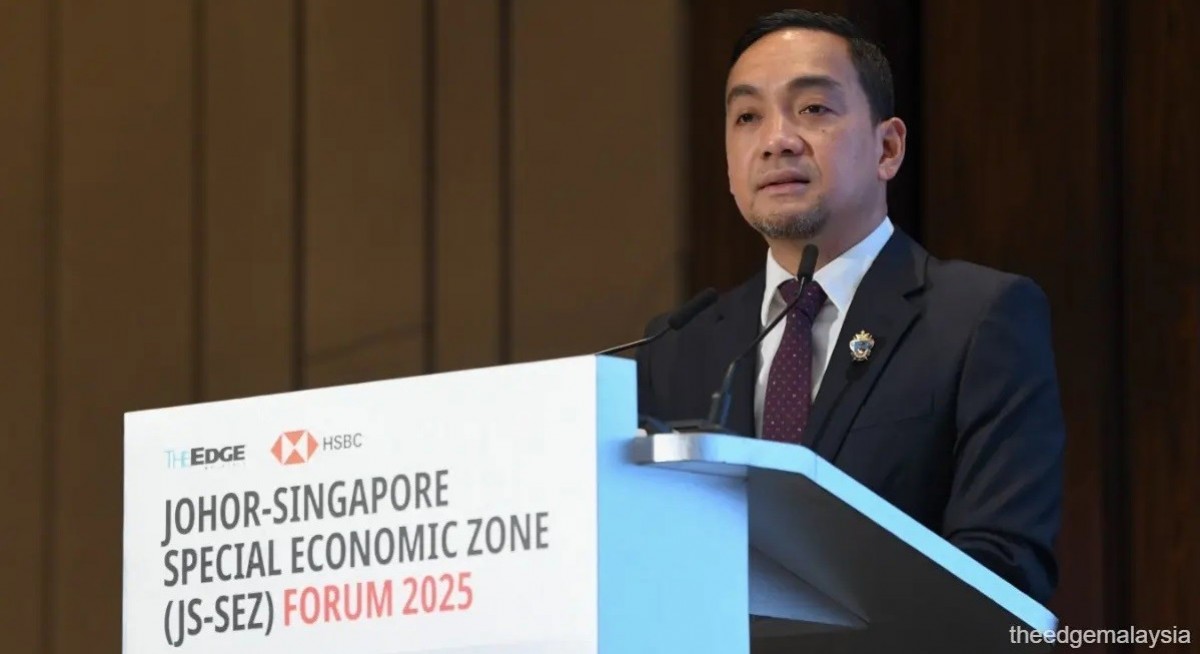“We are confident that Johor is poised to reach between RM60 billion and RM100 billion by the end of this year, surpassing our RM48.5 billion last year,” Onn Hafiz said in his keynote at the The Edge-HSBC JS-SEZ Forum 2025 on Monday.
“This achievement puts Johor firmly on the map as a leading investment destination in the region,” he added.
The bullish outlook comes on the back of growing momentum from the Johor-Singapore Special Economic Zone (JS-SEZ) initiative — which, since its formal agreement in January between Prime Minister Datuk Seri Anwar Ibrahim and Singapore's Prime Minister Lawrence Wong, has begun drawing both domestic and international investor attention.
The JS-SEZ has nine flagship areas and promoted sectors including electrical and electronics, petrochemical and oleochemical, food and agro-processing, logistics, tourism, healthcare, financial and business services, and creative and education.
See also: JS-SEZ ‘once-in-a-generation opportunity’ for cross-border investors, says CGSI’s Tay Wee Kuang
Onn Hafiz aims to transform the state into Malaysia’s most developed by 2030, with a targeted RM260 billion in gross domestic product, 20,000 high-income jobs, and 50 catalytic projects spanning 11 high-impact sectors.
The state launched the Invest Malaysia Facilitation Centre Johor (IMFC-J) in February — a one-stop centre managed by the Iskandar Regional Development Authority (Irda), Invest Johor and the Malaysian Investment Development Authority (Mida) — designed to streamline bureaucratic processes and accelerate investor timelines.
In just five months, the IMFC-J has recorded 439 inquiries, identified 57 potential investments worth RM26.2 billion, and secured six committed investments totalling RM16.7 billion. Processing times have been cut from three months to as little as one, positioning Johor as an efficiency-driven hub for business.
See also: Singapore-based companies have committed over $5.5 bil worth of investments into Johor: DPM Gan
“We are not waiting for the JS-SEZ master plan to be completed,” Onn Hafiz said. “We’re already working tirelessly to address investor demands and accelerate facilitation.”
Former economic minister Datuk Seri Mohd Rafizi Ramli in May said that the government will provide a comprehensive blueprint for the JS-SEZ which is expected to be finalised and unveiled by the end of 2025.
Johor is currently working on several major infrastructure projects. The Johor Bahru-Singapore Rapid Transit System (RTS), set to finish by end-2026, will carry up to 10,000 commuters per hour. Upgrades are also underway at the Sultan Iskandar and Sultan Abu Bakar checkpoints to reduce congestion.
The Gemas-Johor Bahru double-track rail, expected to complete by year end, will cut travel time between Johor Bahru and Segamat to 90 minutes. Additionally, the state is expanding the North-South Expressway to six lanes and planning an elevated autonomous rapid transit system, with proposals going to the Cabinet in August.




